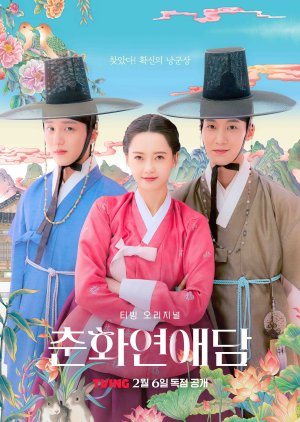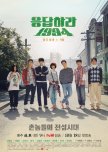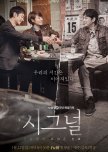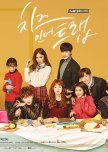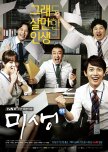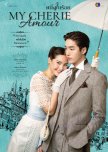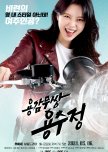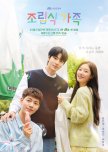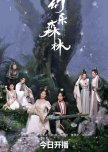
This review may contain spoilers
Didn’t Expect to Love This… But Here We Are! (And the S*x Scenes Hit Different)
‼️Spoiler Alert: This review contains plot details from “The Scandal of Chunhwa.”‼️I just watched the first two episodes, and I have to say—I didn’t expect to love this as much as I do! As someone who doesn’t usually enjoy too much drama, this show strikes the perfect balance between romance, intrigue, and character-driven storytelling.
One thing I really appreciate is that the story doesn’t just revolve around the main leads. The supporting cast also gets their moments, and a lot of their development is centered around their own curiosity about love and intimacy. It’s refreshing to see a K-drama embrace these themes in a more natural, mature way. Considering it’s 2025, it’s pretty bold and exciting to see how K-dramas are evolving, and I’m totally here for it!
And let’s talk about the s*x scenes—they’re not like what we typically see in K-dramas. There’s a different level of depth to them, making them feel more intentional and character-driven rather than just for shock value. It’s a new approach, and honestly, I’m really pleased with how they’re handling it.
Visually, the cinematography and costume design are stunning, fully immersing us in the world of Dongbangguk. The dynamic between Princess Hwa Ri and Choi Hwan is already compelling, and I can’t wait to see how their relationship unfolds.
Overall, if you’re looking for a drama that feels fresh, bold, and a little outside the usual K-drama mold, this is definitely worth watching. Can’t wait for the next episodes!
Was this review helpful to you?
This review may contain spoilers
Refreshing
The story is so not light themed as at first hinted! It's about womens' dreams in an era that women were things, not humans. It's not a historical representation, obviously(and woe to those who take it a face value), but it's a cleverly told story of different aspects of love in such a way that you can't help but root for all the main CP characters. And they don't all get a HE according to kdrama logic. Some are happier alone. There are some loose ends I would have liked tied(eg. What happened to the Empress' brother?Did the scum prince pay for his crimes in the end?) but it's ok. It's not a heavily political or representational drama, but it definitely conveys the message it should: Live your dream and fight on!Was this review helpful to you?
Fantastic Drama!!!
This was an amazing drama! The nudity scenes were minor and I am sure y'all watched series with full nudity so I don't get the hate.The storyline was really good and kept you entertained per episode.
The whole series was based on the princess finding love and she wrote stories about events that happened in her life and her family.
Am I the only one who thought the crown princess looked too old for the crown prince?
It also showed how women can come together and make an IMPACT. I am glad this didn't have much bad blood against each siblings fighting for the crown.
Everyone got their fare support from either a friend or relative.
Overall it is a great drama. Watch it for yourself please!!!!!
Was this review helpful to you?
This review may contain spoilers
what in the deluluuuu is this
okay so i lve just start it it but........ OMG the act , "THEE ACT"!! Its giving pffff. visuals, sounds 👌 and plot ?!!! the actors so far nice and ha ra ... amazing 👏 to bad that my delulu its been fed now and will continue to watch it 😀 🔥🔥🔥🔥🔥🔥🔥🔥🔥🔥🔥🔥🔥🔥🔥🔥🔥🔥🔥🔥🔥🔥🔥🔥🔥🔥🔥🔥🔥🔥🔥🔥🔥🔥😱😱😱😱😱Was this review helpful to you?

YOU are welcome to defend BUT I don't give a Fish
K-Drama Imitating the West While Distorting Joseon HistoryKorean historical dramas have always struggled to find a balance between authenticity and creative storytelling. However, The Scandal of Chun Hwa takes this struggle to a whole new level, presenting an unrealistic, westernized, and outright problematic depiction of Joseon-era Korea. Instead of staying true to the rich cultural and historical aspects of the period, the drama tries too hard to mimic Western storytelling—only to fail miserably.
Joseon Era or Western Fantasy?
One of the biggest issues with this drama is how it distorts historical reality just to fit into a Westernized narrative. Korean directors seem obsessed with copying and pasting everything from Hollywood, even when it makes no sense in a Joseon-era setting. The characters talk and behave as if they belong in a 21st-century Western drama rather than a Korean historical period. The storytelling follows typical Western tropes—weak kings, overly dramatic romances, and forced "girl boss" empowerment that ultimately contradicts itself.
Women Objectified in the Name of "History"
The drama shamelessly uses its historical setting as an excuse to objectify women. A major plot point involves the protagonist, a princess, being unknowingly drawn in erotic paintings that are distributed as part of a secret business. The show tries to romanticize this as a tragic yet thrilling element, but in reality, it only glorifies the exploitation of women. Even more disturbingly, the king—her own father—is portrayed as a powerless figure who does nothing to stop this humiliation.
If the goal was to highlight the struggles of women in Joseon Korea, the drama completely misses the mark. Instead, it treats the suffering of female characters as entertainment, all while dressing it up as a "progressive" story. This reflects a deeper issue in Korean dramas—where so-called "female empowerment" is often nothing more than a woman being used, discarded, and then "saved" by a rich or powerful man.
Korean Society’s View on Women—Then and Now
The drama unintentionally exposes how little has changed in Korean society regarding the treatment of women. Instead of addressing these issues in a meaningful way, it reinforces them under the guise of storytelling. Women in this drama (and many others) are still seen as objects—whether for power, revenge, or entertainment. Despite Korea’s economic rise (thanks largely to the influence of the U.S.), societal views on gender remain deeply problematic.
If this is what Korean entertainment considers "empowerment," then it's no wonder that their dramas continue to struggle with meaningful representation. True empowerment isn’t about selling a woman’s body or suffering for male entertainment—it’s about giving female characters real agency, respect, and strength beyond just being used as plot devices.
Final Verdict
Instead of being a fresh take on historical drama, The Scandal of Chun Hwa is just another attempt to copy Western storytelling while failing to respect its own cultural and historical roots. Worse, it reinforces outdated ideas about women under the illusion of empowerment. Until Korean entertainment stops treating women as objects—whether in Joseon Korea or modern-day Seoul—it will continue to be stuck in this shallow and contradictory cycle.
★☆☆☆☆ (1/5) – Disappointing, unrealistic, and problematic
Was this review helpful to you?
Initially, I wondered who would care about a person's fabricated scandals. However, according to Wikipedia, Chunhwa refers to the Korean erotic art tradition, primarily from the Joseon era.
**Warning: Spoilers Ahead!** The first half of the first episode truly lives up to the drama's title, "The Scandal of Chun Hwa," as the ladies become captivated by the erotic drawings. It is amusing to see one of the maids display comical astonishment while perusing the graphic content. It is a riot when the prince visits a brothel to lose his virginity, and his sister, the princess disguised as a man, also goes there to secretly witness the grand occasion. When the prince's fiancée learns of this, she storms into the brothel to demand what is rightfully hers. After punishing him, she takes him to another location to address the issue of chastity. Later, they even engage in the sedan chair shaking in broad daylight, which leaves her servant feeling embarrassed.
My curiosity was piqued, so I queried Deepseek whether people in the Joseon period were promiscuous based on the Chunhwa erotic art. Deepseek responded that the existence of Chunhwa (春画, "spring paintings") does not imply widespread promiscuity in Joseon society.
While the first two episodes were humorous, the third and fourth episodes became somewhat perplexing. I acknowledge that this is solely my issue; therefore, to prevent negatively impacting other viewers, I should stop here.
Was this review helpful to you?

Vagina Revolution
Questa serie coreana sembra abbia ripreso alcuni lavori famosi precedenti quali bridgerton (1a stagione), crash landing (la scena del parapendio), qualche contatto con Bossam e la libertà sessuale di hit the spot (altra serie interessante coreana di qualche anno fa che parla liberamente di sesso).In verità il mio voto sarebbe 6,5 ma mi sento di dare un altro mezzo punto per il coraggio, perché è rappresentato del "realismo" e le donne qui vengono mostrate come libere, anticonformiste e sessualmente disposte a sperimentare. Per la prima volta le intenzioni sono quelle di rappresentare i rapporti sentimentali in modo completo, senza perbenismi o ipocrisie o mostrando uomini e donne privi di istinti o pulsioni sessuali.
Per la mia esperienza vi dico che è abbastanza esplicito (almeno per quanto riguarda le coppie secondarie), persino per essere un moderno.
E' il racconto di una principessa che vive in maniera soffocante la vita all'interno della corte reale ed evade col pensiero: sogna l'amore e di vivere liberamente sia la relazione che la sessualità. Il racconto viene presentato prevalentemente dal punto di vista femminile, 5 donne tra principesse ereditarie e consorti regine, concubine, figlie di concubine e le loro vicissitudini: la gestione del matrimonio , della maternità che non arriva con le relative pressioni, la maternità, il lutto, il tradimento, la scoperta della sessualità e la ricerca di un marito da parte della nostra protagonista. Le donne mostrate come l'anello debole della società del 1700 anche quando rivestivano posizioni di potere e la loro delicata forza interiore nel tentare di gestire le pressioni esterne, concordandole con i loro desideri più profondi.
Esattamente come accade in Bridgerton, lo show non sembra dare priorità all'accuratezza storica per proporre qualcosa di nuovo e moderno che però ha legami col passato. E proprio come nella serie tv britannica anche qui c'è uno scrittore segreto dietro le quinte (no spoiler), che aggiunge un livello di intrigo/mistery con libri che raccontano le vicende della corte imperiale, denunciandoli apertamente, corredati però in questo caso da espliciti e scandalosi disegni erotici, accolti con molto interesse da parte delle donne dell'epoca (che li leggono con divertita malizia).
Apprezzabile il fatto che la storia non ruota solo attorno ai protagonisti principali ma parla appunto di lotta e di affermazione, riscatto sociale coinvolgendo un po' tutto il cast. Qualcuno ci riuscirà , qualcun altro dovrà abbracciare tristemente il destino.
Visivamente, la cinematografia e il design dei costumi sono abbastanza buono e permettono di immergersi completamente nel mondo fantastico di Dongbangguk MA scenografia a mio avviso è stata molto povera, poco curata (forse a causa di un basso budget): gli interni di una corte reale sono molto spartani, la vita sociale avviene in un bazar che conteneva di tutto.
La sceneggiatura è buona, soprattutto per i dialoghi del protagonista maschile, Choi-Hwan, per quanto riguarda gli altri, i dialoghi perdono spesso in profondità e spessore pur presentando elementi di riflessione interessanti.
La regia e lo stile di ripresa è molto semplice ma non per questo povero, non disturba anche perché deve illustrare una componente più intima del mondo interiore dei personaggi (ringrazio sempre una cara amica che lavora nel settore che mi spiega tante cose).
Ma cosa non ha funzionato in questo lavoro?
TANTE COSE, DIREI. Innanzitutto la storia e la caratterizzazione dei personaggi. Manca una storia avvincente che sviluppi le tematiche proposte, le storie trattate potevano essere condensate e la serie finire già con l'ottavo episodio. La sensazione è quella di proporre qualcosa di già visto, sviluppato molto superficialmente, senza ingegno o acume, senza qualche escamotage intelligente. Se sul piano fisico si propone qualcosa di nuovo non c'è stato altrettanto coraggio a livello di narrazione.
La sessualità proposta, apprezzabile e coraggioso il voler proporre qualcosa di nuovo, più vissuto, intimo e completo ma non completa un percorso di conoscenza e di amore bensì viene proposta "ex abrupto" come avvicinamento, conoscenza, manipolazione dell'altro.
In bridgerton personalmente c'era una storia d'amore che inizia come amicizia, mutuo aiuto supporto e poi il sesso arriva a completamento, qui invece si parte dalla fine, si inizia col sesso e poi...ci si avvicina?
Mica tanto! Infatti non ho ancora capito come alcune coppie si siano innamorate, cosa hanno condiviso a livello di pensieri, vicissitudini, come hanno sviluppato un sentimento?!?
Se l'obiettivo era quello di evidenziare le lotte delle donne nella Corea di Joseon, il drama manca completamente il bersaglio rappresentando una rivoluzione che è semplicemente libera sperimentazione della sessualità mentre vorrebbe trattare la sofferenza dei personaggi femminili come intrattenimento, proponendo una storia "progressista" che realizza le promesse solo a metà.
La rivoluzione è solo sessuale, DA QUI IL TITOLO! Ciò riflette il classico problema nucleare nei drama cino-coreani, dove la cosiddetta "emancipazione femminile" passa spesso attraverso l'intervento più o meno capriccioso dell'uomo, anche qui non fa eccezione proponendo una donna usata, scartata e poi "salvata" dall'uomo di turno che ha i mezzi in termini di intelligenza o ricchezza o semplice volontà nel volerlo fare.
Le donne qui, soprattutto la protagonista che non ha brillato per una recitazione più convincente o per doti interpretative indimenticabili (felicità, tristezza e pianto caricaturale sono le sole emozioni rappresentate), non vengono presentate come ingegnose, furbe e capaci di relazionarsi alla pari con gli uomini (come un drama femminista dovrebbe sapere fare), bensì sono capricciose (la protagonista), incapaci di assumersi le proprie responsabilità, per nulla sveglie e in balìa delle decisioni degli altri. Altro aspetto deludentissimo.
Il drama espone involontariamente quanto poco sia cambiato nella società coreana per quanto riguarda il trattamento delle donne. Invece di affrontare questi problemi in modo significativo, li rafforza sotto le mentite spoglie della narrazione. Le donne in questo drama (e in molti altri) sono ancora viste come oggetti, che si tratti di potere, vendetta o intrattenimento. Nonostante siamo in epoca moderna le opinioni della società sul genere rimangono profondamente problematiche.
Nel complesso, se stai cercando un drama che sia fresco, audace e un po' fuori dagli schemi dei soliti K-drama, vale sicuramente la pena guardare,
Finale ? Positivo ma.... .
Was this review helpful to you?

This review may contain spoilers
Era Uma Vez… Só nos Primeiros Episódios
O drama até começa com uma proposta ousada para os padrões da era Joseon — uma mistura de erotismo, comédia e leve irreverência que flerta com o anacrônico, mas que funciona surpreendentemente bem… nos cinco primeiros episódios. Depois disso, a história se perde em um melodrama arrastado, onde o casal principal, apesar de empenhado, simplesmente não convence. Não é que falte química — é que falta coerência, propósito, algo que justifique o porquê de estarmos investindo nosso tempo nesses dois. E o carisma deles, que deveria carregar o roteiro, acaba sendo engolido pelo peso excessivo do sentimentalismo barato.A frase final, “Eu não fui feliz, mas espero que você seja”, parece querer soar como epifania, mas acaba mais soando como um pedido de desculpas da roteirista ao espectador. Porque fica a dúvida incômoda: tudo aquilo que vimos foi real ou só um devaneio literário? O destino do casal na Joseon parece tão difuso quanto a própria direção do enredo. E no fim das contas, apesar de uma largada promissora, o drama se contenta em ser apenas isso: assistível. Um daqueles que a gente esquece no instante em que a tela escurece.
Was this review helpful to you?

Romance fofo que entrega cenas picantes
Esse Dorama virou uma grande polêmica, ou se ama, ou se odeia…Logo no começo do primeiro episódio já da pra entender que tem uma narradora pra história, porque ela aparece também no decorrer dos episódios, então não tem como não saber que se trata sobre um livro de ficção e romance.
Eu sinceramente gostei da história e do desenrolar dela, sei que como se trata de um livro, existem falhas básicas e aceitáveis sobre a vida no palácio e até do dia-a/dia, mas foi muito aceitável ao meu ver.
Sobre as cenas +18, eu sinceramente achei ok. Admito que fiquei um pouco chocada porque não sou acostumada, mas achei as cenas muito bem feitas, com iluminação e corte de câmeras de muito bom gosto e beleza.
Fiquei apaixonada também pela fotografia, muito bonita, ângulos muito bem pensados, achei perfeito.
Was this review helpful to you?

Surpreendentemente incrível
Dizem que o melhor tempero é a fome. No caso dos filmes e dramas, eu diria que é a baixa expectativa.Com uma divulgação desastrosa e um pôster de gosto duvidoso, tudo indicava que The Scandal of Chun Hwa seria apenas mais um clichê desgastado de comédia romântica, seguindo a mesma fórmula de sempre. O aviso de classificação +18 parecia pura isca para atrair quem buscava apenas cenas picantes.
Talvez por isso eu tenha abaixado tanto minhas expectativas – e, ironicamente, tenha me surpreendido e amado cada detalhe desse drama.
A roteirista deve ser, no mínimo, uma reencarnação de Jane Austen – ou alguém profundamente influenciada por ela. E na dose certa.
A melhor decisão da produção foi ambientar a história na dinastia Joseon. Embora as dificuldades enfrentadas pelas mulheres naquela época ainda ressoem na realidade de muitas hoje, não há cenário mais perfeito para retratar a falta de liberdade sobre nossas próprias escolhas, a imposição do silêncio diante da traição, e a pressão para gerar herdeiros.
E é justamente ao questionar esses encargos que recaem sobre nós que The Scandal of Chun Hwa brilha. Ele constrói personagens femininas fortes, que começam a enxergar as injustiças e sentem, pela primeira vez, o desejo de serem ouvidas. O drama levanta, de maneira inteligente e envolvente, a discussão sobre o que um homem pode fazer e uma mulher não.
O equilíbrio entre drama, comédia e romance é impecável – sem excessos, sem exageros. Além disso, a cinematografia é um espetáculo à parte. A diretora tem uma assinatura visual tão marcante que sua presença é sentida em cada escolha estética.
É verdade que a trama traz muitos clichês, mas eles são tratados com tanta originalidade que ganham vida nova, conferindo ao drama muita personalidade e uma identidade própria.
Voltado para o público feminino, ele estabelece um diálogo direto conosco, como se a roteirista e a diretora estivessem conversando intimamente, compartilhando confidências e fofocas.
E preciso destacar: ver um drama +18 sob uma ótica feminina faz toda a diferença. O sexo aqui é tratado com emoção, e as cenas de carinho são tão íntimas e delicadas que me fizeram sentir tudo – timidez, borboletas no estômago, aquele frio na barriga que só um romance bem construído pode proporcionar.
Estou maravilhada e recomendo demais esse drama.
Was this review helpful to you?
Mente abierta para verlo y captar el mensaje
me gustó la historia. La traje a nuestros tiempos, porque aunque se ha avanzado en temas de igualdad, falta mucho por hacer, en unos países más que en otros. La belleza de algunos dramas es que tocan temas en los que al menos en esos 16 capítulos, puedo tener fe en los cambios, la justicia, esperanza en la humanidad.Se entiende que el final no refleja la realidad de la situación y la época, pero nada quita que puede que en esos años también existieran personas pensantes revolucionarias…
Was this review helpful to you?

